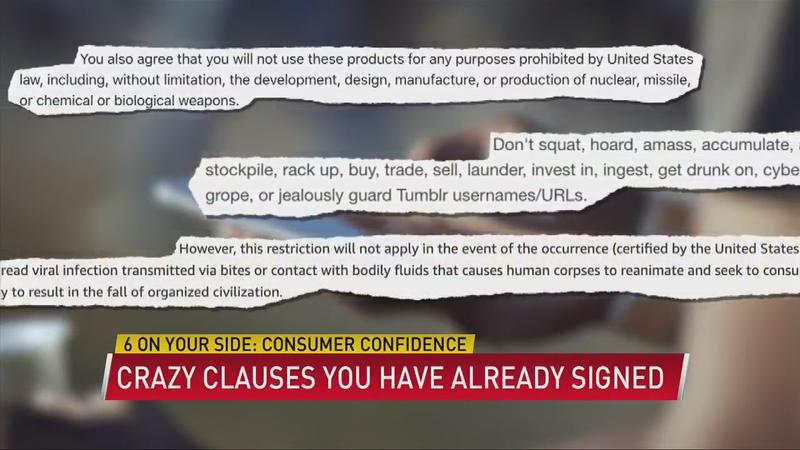6 On Your Side: Consumer Confidence, Crazy Clauses You Have Already Signed
[anvplayer video=”5110827″ station=”998128″]
(ABC 6 NEWS) – Clicking ‘I Agree’ when you’re signing up for a website or new social media account is easy.
But, what are you actually agreeing to?
Consumer Reports’ Justin Brookman is an expert in consumer privacy and technology law and sees a lot of wacky clauses hidden in user agreements.
"You promise not to "get drunk on" Tumblr’s usernames… What does that even mean?" Justin Brookman Consumer Reports Privacy Advocate said.
And this one "…in the case of a viral infection that causes human corpses to reanimate …and likely to result in the fall of … civilization." — Translation?

"It means in the event of a zombie apocalypse amazon’s not going to sue you. I think in a lot of these cases the companies’ lawyers are just having fun," Brookman said.
Fun aside – Justin says there is a lot buried in these agreements that could limit your rights if something goes wrong – including ones that seek to prevent users from posting negative reviews.
Take Intel which says "Violators will be prosecuted to the maximum extent possible." Intel told Consumer Reports it’s to protect the company from inaccurate reviews, but hasn’t enforced it recently.
Many of these clauses may now be illegal due to legislation passed a few years ago – but some companies still include them.
"I think it’s a scare tactic. I think they know that consumers don’t necessarily know the law. But if you lie about them, if you defame them, then that’s not protected and companies have a right to sue you for it," Brookman said.
Some go further, saying you can’t sue a business over a dispute, making you resolve your issues outside the courts, with an arbitration clause.
AT&T uses language typical in many agreements "…you are … waiving the right to a trial by jury or to participate in a class action."
AT&T declined to address why the company sought to eliminate the possibility of class-action lawsuits but argued arbitration is faster and less expensive for consumers.
But Consumer Reports says that’s not fair.
"If your product breaks or something goes wrong or if it hurts you, you should have a right to go to court and sue them for the damages that it caused," Brookman said.